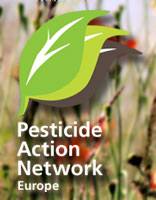20 December 2010
Brussels
Toxic Christmas gift: Council decides to keep hazardous biocides
on market
Today, the Environment Council of the European Union adopted its political agreement
on a new authorisation system for household pesticides and other biocides.
Environment and health NGOs, PAN Europe, PAN Germany, HEAL, WECF, HCWH
Europe, IEW and PAN UK, sharply criticize the EU environment ministers' approach
because their decision will allow continued wide circulation of highly toxic consumer
products on the market. This approach is a step backwards from the European
Parliament' call for the promotion of alternatives and from EU chemical laws like
REACH and the pesticide legislation.
The environment ministers adopted their position on the EU biocides regulation which
regulates more than 50.000 biocidal products on the EU market such as household rodent
poison, smell-free socks or antibacterial cleaners.i Many of these products contain
substances which are cancer-causing, toxic to the immune system, hormone disruptors or
cause other serious impacts for human health and the environment.
"The Council does not ensure an effective ban on highly hazardous biocides like
Carbendazimii or Triclosan.iii. It does not prioritize available sound alternatives instead," says Carina Weber, executive director of Pesticides Action Network Germany.
The Council even eludes the call of the European Parliament for strategies that help to
efficiently replace and swiftly phase out such products, by banning their EU-wide
authorisation for the protection of human health and the non-targeted wildlife. The new
European Union authorisation could cancel stricter national protection standards in 75% of all
biocides application areas.iv
Although the Council suggests some promising provisions like addressing biocides mixture
effects, nano-biocides and the protection of children or pregnant women, such measures are
jeopardised by contradictory requirements in the new draft law.
"We are disappointed that EU Environment Ministers fall short of ensuring the highest level of
protection for those that are most vulnerable, such as children or pregnant women. It is
regrettable that Ministers decided to excuse biocides with developmental neurotoxic and
immunotoxic effects from substitution. Their inclusion would have helped facilitate the development of safer products," says Anne Stauffer, Policy Manager from Health and
Environment Alliance. It is not even ensured that relevant products are only used by
professional users.
"More than 15.000 poisonings have been already recorded in Europe, a majority of which is
related to professional or household use of insecticides, rodenticides, disinfectants,
repellents and wood preservatives.v And this figure seems to be the tip of an iceberg as there
is no tracking or no efficient recording in many EU Member States, let alone no existing
ways, like an adequate labelling of all articles containing biocides, to minimize the risks for
children or pregnant women", states Elisabeth Ruffinengo, Advocacy Officer of Women in
Europe for a Common Future.
"The use of biocides is an increasing global problem that might enhance the dissemination
and development of antibiotic resistant bacteria. This problem must to be taken seriously." reports Dr Åsa Melhus, Departrment of Clinical Microbiology, Uppsala University Hospital
Uppsala, Sweden and member of Health Care Without Harm Europe (HCWH Europe) and
HEAL.
The wide and unnecessary use of antibacterial cleaners results in emerging health and
environmental risks, such as the antimicrobial resistance to effects of biocides. Bacterial
resistances to biocides due to improper use have been already reported.vivii
The Environment Council opposes EU-wide measures for ensuring the proper use of these
and other problematic products, such as a sufficient qualification of salesmen.
Environmental and health NGOs are also concerned that today's decisions will not help to
reduce the dependency on biocidal products. In contrast, this will be a step back from current
chemical laws like REACH and the Pesticide Regulation, which encourage the substitution of
chemicals of very high concern.viii
There is no consistent effort of promoting preventive measures that can help to minimize the
dependency on biocidal products, and their related impact on health and the environment.
"This is disappointing but perhaps not surprising given the power that the chemical industry
has over government decision making. Rather than listen to the voice of the people industry
wins once again," states Nick Mole, Policy Officer of Pesticide Action Network UK.
NGOs therefore renew their call for a Community Framework Directive that ensures
Action Plans for the sustainable and proper use of biocidal products and for the
promotion of safer alternatives. "Such measures need to be adopted for the coming
second reading negotiations on the biocide regulation in 2011", says Gergely Simon,
board member of Pesticides Action Network Europe.
— ENDS —
Background notes:
-
Joint letter of 14 december to Belgium Presidency to tlimit derogations on hazardous biocides
For further information please contact:
Christian Schweer (Pesticide Action Network Germany/ Europe)
Tel. + 49 40-399 19 10-0
christian.schweer@pan-germany.org
Anne Stauffer (Health and Environment Alliance)
Tel +32 2 234 3643
anne@env-health.org
Eva Haxton ( Health Care Without Harm Europe Europe)
Tel.: + 46 18 611 90 97
E-mail: Eva.Haxton@medsci.uu.se
Valérie Xhonneux (Fédération Inter-Environnement Wallonie)
Tel.: + 32 81/390 763
E-mail: v.xhonneux@iewonline.be
Nick Mole (Pesticide Action Network UK)
Tel. + 44 20 7065 0905
Email: nickmole@pan-uk.org
Gergely Simon (Pesticide Action Network Europe)
Tel. +36 14110509
Email: gergely@pan-europe.info
Elisabeth Ruffinengo (Women in Europe for a Common Future)
Tel/fax: + 33 (0)4 50 49 97 38
elisabeth.ruffinengo@wecf.eu
< Back


